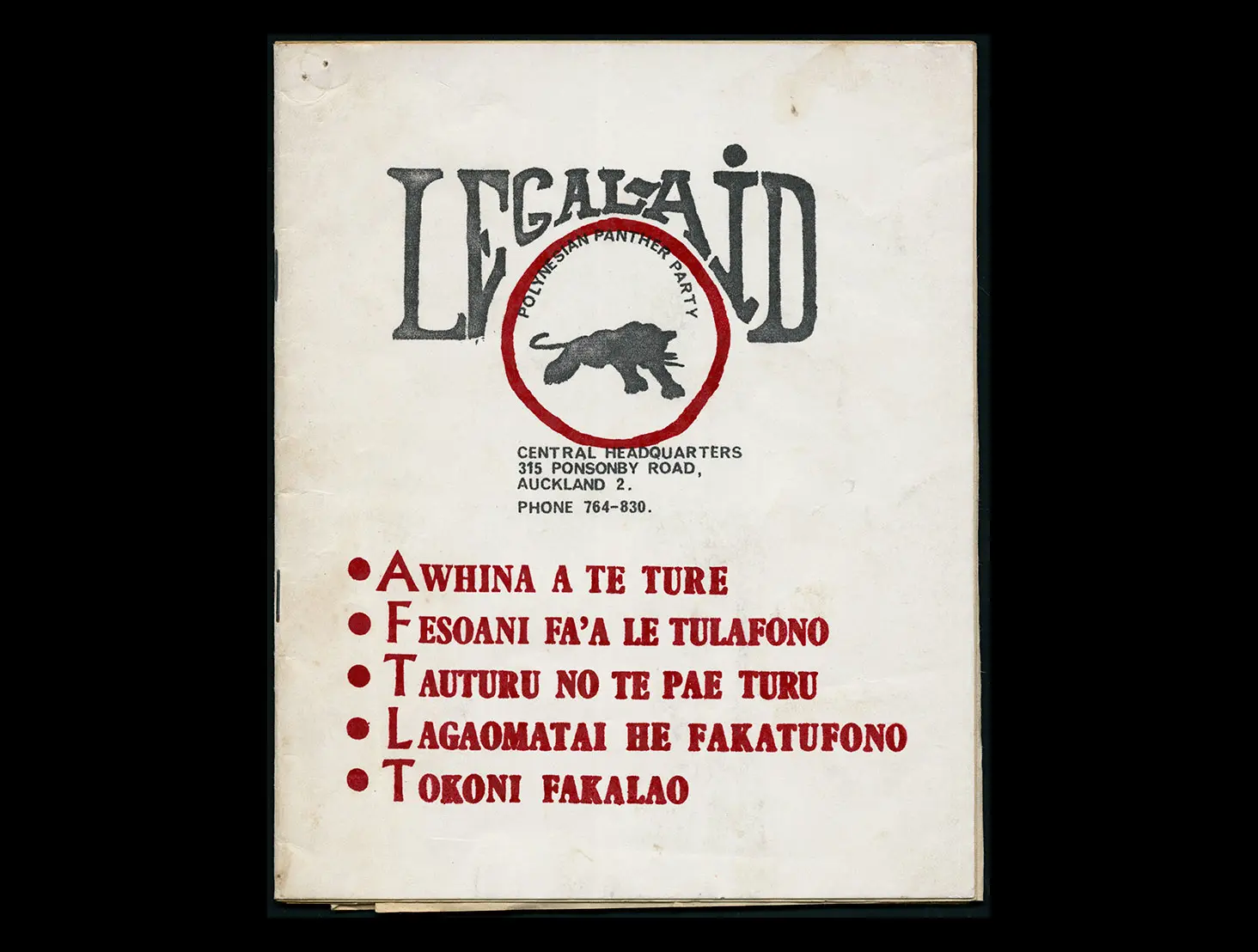Image credit: Cover of Polynesian Panther Party legal aid book, ca 1973–1974. Ref: 95-222-1/09-02 Alexander Turnbull Library.

Image credit: Cover of Polynesian Panther Party legal aid book, ca 1973–1974. Ref: 95-222-1/09-02 Alexander Turnbull Library.

The Aotearoa NZ Polynesian Panther Party was inspired by the American Black Panthers. The party was formed in 1971 in response to racism and oppression experienced by Pacific peoples. Find out more, and explore our collections and curated resources.
This item is part of a collection donated to the Turnbull Library in 1995 by human rights activist David Wickham. It gives a glimpse into the work of the Polynesian Panther Party (PPP) for their community and for Pasifika people generally.
The Polynesian Panther Movement, as it was first known, was formed in 1971 by a group of Pacific Islanders in their later teens and early twenties — mainly Samoans, Tongans and Cook Islanders, along with a few Māori. Most were from low-income family backgrounds, with homes in Auckland’s inner suburbs. Many of them were high school or university students.
The Polynesian Panthers were inspired by the American advocacy group the Black Panthers, and the movement was set up, according to founding member Will ‘Ilolahia, ‘because of the racism, discrimination and all-round oppression’ evidenced in the crackdown on immigration facing Pacific Islanders in New Zealand at the time. Pasifika people were being targeted by police, not only in the notorious dawn raids, but also at work and on the street. They would be randomly stopped and asked for their passports, picked up for minor incidents and often subjected to racial discrimination, abused in public as ‘bungas’, ‘coconuts’ and ‘niggers’.
The Panthers were portrayed negatively in the media, but they wanted to help their people and were community focused. They were the first organisation in New Zealand to set up and run homework centres. Their Tenants Aid Brigade advocated for tenants’ rights, they ran food banks and they had a programme for the incarcerated, Prisoners Aid.
The multilingual legal aid handbook, created with the help of lawyer (and future prime minister) David Lange, was designed to educate people about their rights and how to deal with the police, especially when being stopped and questioned (or getting pulled up just for being brown, as many Pasifika suspected). One of the Panthers’ most memorable actions was ‘dawn-raiding’ politicians to give them a taste of the stresses ordinary Pacific Islanders faced.
The PPP disbanded after the 1981 Springbok rugby tour protests, but in recent years former members have found a renewed interest in their experience. They have rejuvenated their work with their Educate to Liberate speaking programme, connecting with thousands of people, especially the young, of all cultures. As Pasifika activist, and author of a book on the Panthers, Melani Anae says, ‘Once a Panther, always a Panther’.
Story written by: Suliana Vea
Copyright: Turnbull Endowment Trust
Read connected stories from Te Kupenga:
Topic Explorer has:
Many Answers has Dawn raids (New Zealand).
Want to share, print or reuse one of our images? Read the guidelines for reusing Alexander Turnbull Library images.
Tikanga ā-iwi:
Te whakaritenga pāpori me te ahurea
Te ao hurihuri
Te wāhi me te taiao
Ngā mahinga ohaoha.
Te Takanga o Te Wā (ngā hītori o Aotearoa):
Tūrangawaewae
Mana motuhake
Whanaungatanga.
Social sciences concepts:
Identity, culture, and organisation
Place and environment
Continuity and change.
Aotearoa New Zealand’s histories:
Māori history is continuous
Colonisation and its consequences
The exercise of power
Relationships and connections between people.